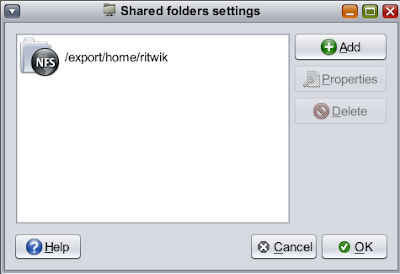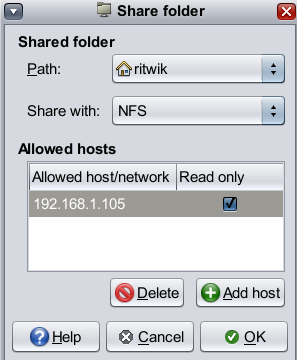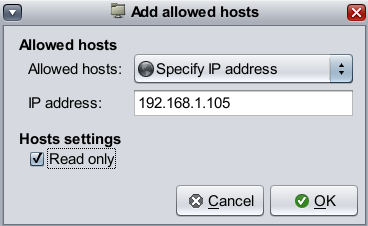
Samba server implementation allows a linux system to interact with a windows network. At my home I have a router which connects my desktop PC where Windows XP professional is installed with ip address 192.168.1.100 and a laptop where Fedora 7 is installed with ip address 192.168.1.102.
Now configuration details for windows system :
1) I have an administrator account in my windows sytem with username "ritwikghoshal" and password (say) "windows".
2) Share directories / drives as you wish. I shared Netbeans project folder and "D" drive of my system. Just right click on the directory / drive and choose sharing.
3) Go to Control panel --> Network setup wizard --> click next --> I used the existing shared connection for the computer's internet access (i.e the recommended settings) --> Click next.
4) Computer Description : "desktop" --> Computer Name : "RITWIKD" --> Click Next.
5) Workgroup Name : "mygroup" --> Click Next --> Turn on file and printer sharing --> Next.
6) Just finish the wizard
Configuration details for Linux system :
1) Ping test : First I performed a ping test to check if windows system is reachable
[root@ritwik ~]# ping 192.168.1.100
PING 192.168.1.100 (192.168.1.100) 56(84) bytes of data.
64 bytes from 192.168.1.100: icmp_seq=1 ttl=128 time=10.2 ms
64 bytes from 192.168.1.100: icmp_seq=2 ttl=128 time=2.24 ms
64 bytes from 192.168.1.100: icmp_seq=3 ttl=128 time=2.06 ms
64 bytes from 192.168.1.100: icmp_seq=4 ttl=128 time=1.85 ms
--- 192.168.1.100 ping statistics ---
4 packets transmitted, 4 received, 0% packet loss, time 3000ms
rtt min/avg/max/mdev = 1.854/4.103/10.253/3.553 ms
2) Check whether Samba is installed :
[root@ritwik ~]# smbd -V
Version 3.0.28-0.fc7
If you don't get any o/p like "Version 3.0.28-0.fc7" that means you don't have samba installed. Then try to install it first.
3) set Firewall to consider samba as trusted service :
System -> Administration -> Firewall and SElinux
Now check samba in Firewall option's trusted services.
4) Service Configuration :Start "smb" services
System -> Administration -> server settings -> services
Start smb service.
5) Samba Server Configuration :
System -> Administration -> samba
I. Server settings : Preferences -> Server settings
Here workgroup name would be same with windows' workgroup name i.e "mygroup". (windows config : step 5).
II. Samba Users : Preferences -> Samba users -> Add user
windows' username : it would be same with the username of your windows system , mine was "ritwikghoshal" (windows config : step 1).
setup a password , mine was "fedora".
III. Add share : add a directory , give a sharename , set necessary permissions . Description field is optional. I shared three directories from my home directory : software, study and NetBeans project folder.
6) Restart samba service :
System -> Administration -> server settings -> services
Restart smb service.
Access windows' share from Fedora 7 :
After following the abovesaid steps I checked the Network directory.It contained 4 icons : "RITWIK" , "ritwik's public files on ritwik" , "SFTP File Transfer on ritwik" , "Windows Network".
"RITWIK" : contained shared files of fedora (study, software , nbproject dir etc.)
"ritwik's public files on ritwik" : contained nothing
"SFTP File Transfer on ritwik" : contained root directory.
"Windows Network" : contained 2 icons , 'mshome' & 'mygroup'.
'mshome' had 'RITWIKD' where I found all windows' shared files.
'mygroup' contained same 'RITWIK' directory.
Access Fedora's share from windows :
Go to start -> Run -> open : \\192.168.1.102
Hit the return key and a browser window will display all shared files of Fedora system.
So... you are done !!!
You may also like to use commands than GUI , in that case ..
Configure IPTABLES for firewall issue
start / restart smb service by using commnds like :
/etc/rc.d/init.d/smb start
/etc/rc.d/init.d/smb restart
Edit /etc/samba/smb.conf and /etc/samba/smbusers to configure samba server.
I have used the following command to mount windows' "E" directory to my fedora home, in a directory named "WinShare".
[root@ritwik ~]# mount -t cifs -o username=ritwik,password=fedora,ip=192.168.1.100 //Ritwikd/E /home/ritwik/WinShare
.. and the following one to unmount :
[root@ritwik ~]# umount /home/ritwik/WinShare













